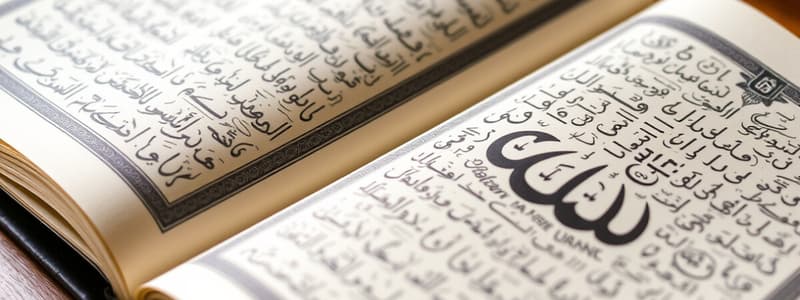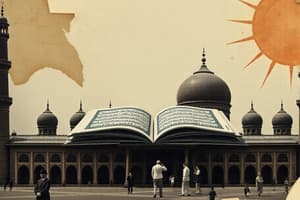Podcast
Questions and Answers
What is the primary role of the Qur’an in the lives of Muslims?
What is the primary role of the Qur’an in the lives of Muslims?
- It is considered primarily a cultural artifact.
- It serves as a historical and literary document only.
- It is a holy book that influences the daily rituals and personal piety. (correct)
- It acts solely as a source of moral and legal solutions.
How does the Qur’an relate to the Arabic language according to Muslim belief?
How does the Qur’an relate to the Arabic language according to Muslim belief?
- Arabic is considered the language of Allah and holds significant importance. (correct)
- The Qur’an is believed to possess no linguistic significance.
- Arabic is viewed as a barrier to understanding the Qur’an.
- Translations of the Qur’an are preferred over the Arabic text.
What change has occurred in the way people engage with the Qur’an due to media advancements?
What change has occurred in the way people engage with the Qur’an due to media advancements?
- Listening to the Qur’an has become less accessible.
- Recitation is now solely a collective experience.
- Access to traditional interpretations has increased significantly.
- Engagement with the Qur’an has shifted toward a more individual practice. (correct)
Which aspect of the Qur’an is emphasized during daily prayers?
Which aspect of the Qur’an is emphasized during daily prayers?
What is a traditional expectation regarding the decorum during Qur’an recitation?
What is a traditional expectation regarding the decorum during Qur’an recitation?
Why is the Qur’an viewed as a sacred object?
Why is the Qur’an viewed as a sacred object?
What impact has increased education had on the engagement with the Qur’an?
What impact has increased education had on the engagement with the Qur’an?
What component of Islamic practice emphasizes listening to the Qur’an?
What component of Islamic practice emphasizes listening to the Qur’an?
What is stated about who may touch the Qur’an?
What is stated about who may touch the Qur’an?
What is the title traditionally given to the Qur’an that signifies its nature?
What is the title traditionally given to the Qur’an that signifies its nature?
Which element is said to be second in importance to the Qur’an for legal and moral judgment in Islam?
Which element is said to be second in importance to the Qur’an for legal and moral judgment in Islam?
What do both the Qur’an and hadith literature serve as a foundation for?
What do both the Qur’an and hadith literature serve as a foundation for?
What does the phrase 'hidden Book' suggest about the Qur’an?
What does the phrase 'hidden Book' suggest about the Qur’an?
Which aspect of the Qur’an is addressed in traditional exegesis or explanation (tafsir)?
Which aspect of the Qur’an is addressed in traditional exegesis or explanation (tafsir)?
What do the terms 'al-Qur’an' and 'al-Kitab' emphasize about the Qur’an?
What do the terms 'al-Qur’an' and 'al-Kitab' emphasize about the Qur’an?
How are previously sent revelations portrayed in the Qur’an?
How are previously sent revelations portrayed in the Qur’an?
Flashcards are hidden until you start studying
Study Notes
The Qur'an: Core Aspects
- The Qur'an is the supreme canonical text of Islam, influencing approximately 1.5 billion Muslims globally.
- Viewed as Allah's direct message, it serves multiple purposes: moral and legal guide, historical document, literary work, devotional manual, and sacred object.
- Integral to daily rituals, particularly in the five daily prayers, with the opening sura (al-Fatiha) marking important ceremonial sequences.
- Recitation of the Qur'an is essential in both mosque gatherings and private settings, emphasizing its role in community worship.
Language and Sound
- Arabic is considered the language of Allah, with the sound of the text connecting deeply with the Arabic language even among non-Arabic speaking Muslims.
- The pronounced recitation of the Qur'an is believed to offer protection and blessings.
Impact of Media and Education
- Recent changes in media facilitate individual listening to the Qur'an, shifting from communal to personal engagement through cassettes, CDs, and online access.
- With increasing education levels, more Muslims can access Arabic texts and translations, fostering independent interpretations of the scripture.
Respect and Presentation
- The Qur'an is treated as a sacred object, requiring a pure environment where it is kept, often displayed with symbols of piety like images of the Kaaba and calligraphic art.
- A specific decorum is observed during recitation, emphasizing respect for the text.
Self-Characterization of the Qur'an
- The Qur'an describes itself as "noble," intended for the "purified," reinforcing its sanctity and the proper manner of engagement.
Exegesis and Interpretation
- Various directions of Qur'anic exegesis (tafsir) and biographical literature on Prophet Muhammad (sira) will be explored.
- The roles and historical background of theological schools contribute to different interpretative methods and positions regarding the Qur'an.
Hadith and Juridical Foundations
- Hadith, the collected narrations from Muhammad's life, follow the Qur'an in importance for legal and moral judgements.
- Both the Qur'an and hadith serve as the foundation for Islamic jurisprudence, assisting in interpreting Muhammad's normative behavior (sunna) for contemporary issues.
Nature of the Qur'an
- The term "Qur'an" is often translated as the "Recitation" (al-Qur'an) or "Book" (al-Kitab), highlighting its status as the ultimate validation of faith principles.
- Previous revelations are acknowledged in the Qur'an, which claims they were misunderstood or corrupted, with recognizable texts linked to specific religious groups.
Studying That Suits You
Use AI to generate personalized quizzes and flashcards to suit your learning preferences.




